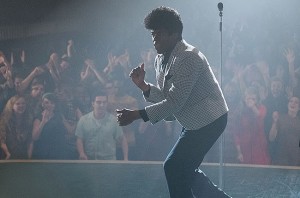GET ON UP: 4 STARS. “a gold standard performance from Boseman.”
 He was called many things. The Godfather of Soul, Soul Brother No. 1, Mr. Dynamite, and The Hardest Working Man in Show Business but he preferred to be called Mr. Brown.
He was called many things. The Godfather of Soul, Soul Brother No. 1, Mr. Dynamite, and The Hardest Working Man in Show Business but he preferred to be called Mr. Brown.
James Brown is probably best remembered as the hit maker behind “Get Up (I Feel Like Being a) Sex Machine” and “I Feel Good”; a larger-than-life, cape-wearing showman who made funk a household word over a career than spanned six decades.
A new film, “Get on Up,” aims to fill in the blanks, detailing Brown’s rise from poverty to the top of the R&B charts.
Chadwick Boseman, who, after earning accolades for his performance as Jackie Robinson in”42,” seems to be making a career of playing 20th century legends on screen, plays Brown from age 16 to 60.
In non-linear, cut and paste style, the film tells of an abusive South Carolina upbringing at the hands of his sharecropper father (Lennie James) and a mother (Viola Davis) who abandoned the family early on to career highlights like the incendiary T.A.M.I. Show performance where he upstaged the Rolling Stones, (whose singer Mick Jagger produced this movie). It covers his close friendship with singer-songwriter Bobby Byrd (Nelsan Ellis), a brush with death on a USO show and a young James pulling two-tone loafers off a lynched man.
“Get on Up” is the second musical biopic of the summer but the first one to vibrate with energy, spirit and soul. Where “Jersey Boys” felt staid and straightforward, “Get On Up” is as loose-limbed and funky as one of Brown’s groove-heavy singles.
Some may find the non-linear time jumping scenes that bookend the film arrhythmic, but the randomness of those sequences—it jumps, willy nilly from the 1940s to Brown’s 1970s heyday to a wild scene that lead to his 1988 arrest—breaks the standard rags-to-riches-to-arrests biopic formula. Director Tate “The Help” Taylor takes an impressionistic view of Brown’s life, integrating some magic realism and fourth wall breaking dialogue direct to camera in a bold approach to a very mainstream genre.
Stylistic flourishes aside, there are the usual biographical “one day everyone will know your name” show biz clichés, but the movie is smart enough not to rely on those elements to tell the story. Instead Tate relies on an extraordinarily charismatic performance—one guesses it’s a liberal mix of fact and fiction, life and legend—from Boseman to illuminate Brown’s angels and demons.
He’s called a musical genius more than once, and given his legacy it’s hard not to agree, but some of the more unsavory parts of Brown’s life are glossed over. The drug use and domestic abuse that checkered his life (and arrest record) are touched on but not explored with the same interest as the upward trajectory of Brown’s musical career.
Like the expert backing bands that supported Brown throughout his career, here the character is supported by very good actors. As life-long friend Bobby Byrd, Nelsan Ellis shows he has more range than simply playing Lafayette Reynolds on “True Blood” every week and Dan Aykroyd has fun with the role of Brown’s manager. It’s a shame that good performances from Craig Robinson, as sax legend Maceo Parker, and Viola Davis as Brown’s mother, are limited to extended cameos.
“Get On Up” is one big chunk of funk with a gold standard performance from Boseman and music that will make you want to… er… get on up.
